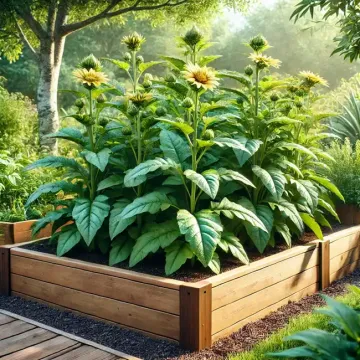Jerusalem artichokes, also known as sunchokes, are a versatile and underappreciated root vegetable that can thrive in your home garden. Despite their name, they have no relation to artichokes and are native to North America, making them well-suited to a variety of climates. This hardy perennial tuber, part of the sunflower family, can be an excellent addition to your garden. Let’s explore how to grow, care for, and harvest Jerusalem artichokes in your home garden.
Introduction to Jerusalem Artichokes
Jerusalem artichokes (Helianthus tuberosus) are tall, sunflower-like plants that produce underground tubers, which are edible. These tubers have a crisp, nutty flavor that resembles water chestnuts when raw and turn soft and sweet when cooked. In addition to their culinary uses, Jerusalem artichokes are valued for their ability to improve soil health and provide habitat for beneficial insects.
The plants can grow up to 10 feet tall, with bright yellow flowers that bloom in late summer or early fall. The tubers, which are the edible part of the plant, vary in size and shape, often resembling knobby potatoes.
History of Jerusalem Artichokes
Native to central North America, Jerusalem artichokes were cultivated by indigenous peoples long before European settlers arrived. The tubers were a staple food for various tribes, including the Native Americans, who introduced them to European explorers. The plant was later brought to Europe, where it gained popularity as a food crop. Its name, "Jerusalem artichoke," is a bit of a linguistic mix-up. The Italian word for sunflower is "girasole," which likely morphed into "Jerusalem," while "artichoke" was added due to the similarity in taste to the traditional artichoke.
Growing Jerusalem Artichokes in Your Garden
Growing Jerusalem artichokes is relatively easy, as they are hardy plants that can tolerate a range of soil types and weather conditions. Here’s what you need to know to get started:
- Planting:
- Location: Jerusalem artichokes prefer full sun but can tolerate partial shade. Choose a spot in your garden that receives at least six hours of sunlight daily.
- Soil: They are not picky about soil quality and can thrive in sandy, loamy, or clay soils. However, well-drained soil with organic matter is ideal. Avoid overly compacted or waterlogged soils.
- Planting Time: Plant tubers in early spring, as soon as the soil can be worked. Tubers should be planted about 4 to 6 inches deep and spaced 12 to 18 inches apart. Rows should be spaced about 3 feet apart to allow for the plants' tall growth.
- Watering:
- Jerusalem artichokes require regular watering, especially during dry spells. Keep the soil consistently moist but not waterlogged. Once established, they are relatively drought-tolerant but will produce better yields with consistent moisture.
- Fertilizing:
- These plants do not need much fertilization. A moderate application of compost or a balanced fertilizer (such as 10-10-10) at planting time is usually sufficient. Avoid over-fertilizing, as this can lead to excessive foliage growth at the expense of tuber production.
- Maintenance:
- Jerusalem artichokes can spread aggressively, so it's important to manage them carefully. Consider planting them in a contained area or raised bed to prevent them from taking over your garden.
- Mulch around the plants to conserve moisture and suppress weeds. Once the plants reach maturity, you can cut back the flower stalks to encourage tuber development.
Harvesting Jerusalem Artichokes
Jerusalem artichokes are typically ready to harvest in late fall, after the first frost. Frost actually improves the flavor of the tubers, making them sweeter. Here’s how to harvest them:
- Harvest Time: Wait until the foliage has died back before harvesting. You can begin digging up tubers after the first frost.
- Storage: Jerusalem artichokes do not store well out of the ground. If you live in a mild climate, you can leave them in the ground and dig them up as needed. In colder climates, harvest them all at once and store them in a cool, dark place, such as a root cellar or refrigerator, for a few weeks.
Culinary Uses of Jerusalem Artichokes
Jerusalem artichokes are highly versatile in the kitchen. Their nutty flavor and crisp texture make them a great addition to various dishes. Here are some popular ways to use them:
- Raw: Thinly slice Jerusalem artichokes and add them to salads for a crunchy texture.
- Roasted: Toss them with olive oil, salt, and herbs, then roast them in the oven until golden and crispy.
- Mashed: Boil the tubers and mash them with butter and cream, much like potatoes.
- Soups and Stews: Add them to soups and stews for a subtle sweetness and texture.
Benefits of Growing Jerusalem Artichokes
- Low Maintenance: Once established, Jerusalem artichokes are a low-maintenance crop that can thrive with minimal attention.
- Perennial Nature: They are a perennial plant, meaning they will return year after year without the need for replanting.
- Soil Improvement: The deep roots of Jerusalem artichokes help to aerate the soil, and the plant itself can act as a natural mulch, improving soil structure and fertility over time.
- Attracting Pollinators: The bright yellow flowers attract pollinators such as bees and butterflies, benefiting the entire garden ecosystem.
Conclusion
Jerusalem artichokes are a fantastic choice for gardeners looking to diversify their home garden with a hardy, low-maintenance, and productive plant. With their unique flavor, culinary versatility, and ecological benefits, these tubers are a worthwhile addition to any garden. Just be mindful of their ability to spread, and you’ll enjoy a bountiful harvest for years to come!

